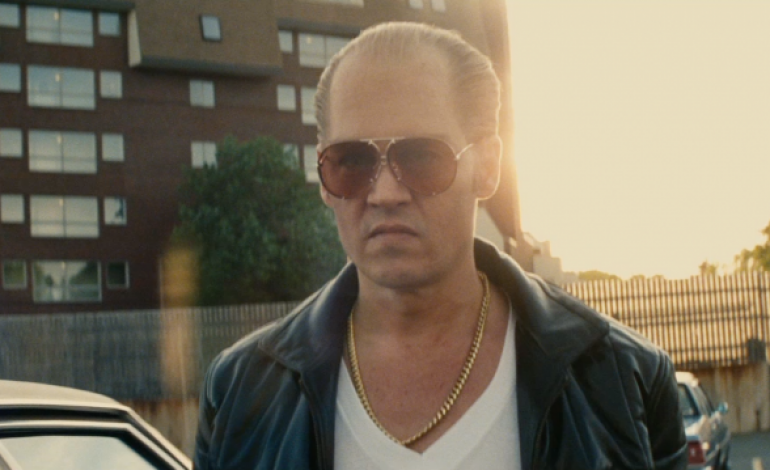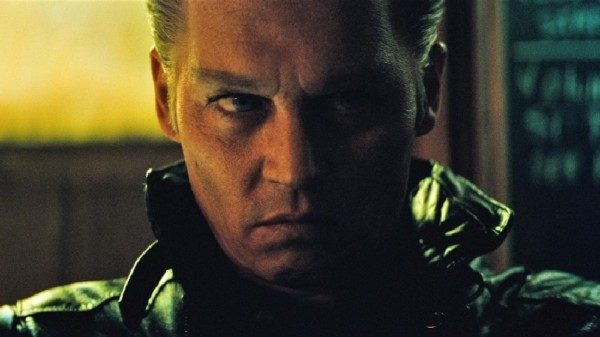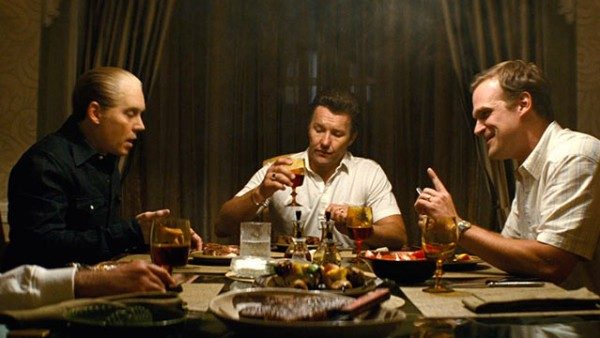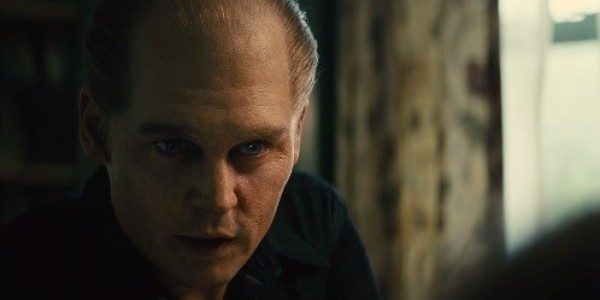

While handsomely made and strikingly well acted by a crackerjack ensemble cast, Black Mass– a biographical true crime story focusing on infamous Boston baddie James ‘Whitey’ Bulger- can’t help but carry a whiff of the overly familiar. The gangster genre, after all, has been around for nearly as long as cinema itself and in that time has since been sensationalized, romanticized and Scorsese-ized so much so that specific beats tend to come as second nature- for instance, every time a rat shows up, a whack tends to follow. Director Scott Cooper (Crazy Heart, Out of the Furnace) doesn’t uproot the formula nor exactly pay homage to it in Black Mass. Instead, he points his camera straight ahead and finely showcases a talented collection of actors and leaves well enough alone. Which makes for an admirable, if ultimately minor, finished product.
Bulger and his story seem appropriate fits for the cinema nonetheless. As nefarious crime boss of the Winter Hill Gang, Bulger headed numerous seedy activities which included money laundering, drug trafficking, extortion, oh, and murder. Also, for nearly a decade, Bulger was an informant for the FBI, or something to that effect. Pop culture has already taken an interest in Bulger, as these things tend to go- Jack Nicholson’s character in Martin Scorsese’s The Departed (2006) was a loose interpretation and Joe Berlinger (Paradise Lost) examined the mob boss in the 2014 documentary Whitey: United States of America v. James J. Bulger. In Black Mass, Johnny Depp, taking a break from blockbuster duty and cartoon tomfoolery, portrays Bulger.
It’s a solid performance too, if not exactly the career rejuvenation hoped for such a strikingly idiosyncratic performer who in recent years seems to have lost his sea legs in what with the endless Pirates of the Caribbean sequels and Tim Burton cartoons. Here, Depp is all coiled intensity yet rarely raises the voice- you get an adequate and chilling sense in the movie that whenever Bulger spoke, a ripple would be cemented in one’s brain, perhaps permanently so. What distracts from the performance (and carries an even bigger ripple throughout the feature) is the awkward, if elaborate, make-up effects used on the actor. Depp’s handsome mug is fussed over with prosthetics galore and a delicately, if implausibly, styled reseeding hairline to the point he half resembles a corpse. You want to see the threads of danger and humanity in his eyes, instead you might wonder how a vampire is allowed to roam the streets of South Boston in broad daylight.
It’s a shame that Depp is covered so since there’s value in what he brings on screen, even as Black Mass moves at a study click to try and bring as much of the Bulger story in at a reasonable running time. As such, Cooper and screenwriters Mark Mallouk and Jez Butterworth (Edge of Tomorrow)- adapting from the book by Dick Lehr and Gerard O’Neill- gloss through the story with the pace and vigor of a special episode of Law & Order. We start in the mid 1970s with a newly released from prison Bulger setting court for a larger market of crime and zip through various chapters of his professional and personal life. It’s not that Black Mass is at a loss for strong scenes, it’s just that the film’s episodic format tends to disrupt much in the way of narrative momentum. Repeated constantly is the recurring pattern of both friends and foes alike getting in the way of Bulger’s operation. Cut to the next scene and they are completely removed from the picture. The mob hit is, of course, essential to a story like this, but there’s a derivative, slightly inelegant nature in the shaping of Black Mass that prevents the film from truly sparking. It can’t help but seem a tad GoodFellas-lite.
The ultimate access point in the movie comes in the unlikely “alliance” between Bulger and FBI agent John Connolly (Joel Edgerton, Warrior). Connolly, a fellow Southie, happened to be a childhood acquaintance of Bulger and his younger brother Billy (a steely Benedict Cumberbatch), a then purposely looking-the-other-way President of the Massachusetts Senate. Connolly hopes to bring Bulger on as an informant to help infiltrate an Italian crime family in exchange for providing a certain degree of security for the Winter Hill Gang, so long as they don’t “kill anyone.” It’s a fascinating relationship even if the way it’s staged, like much in the movie, recalls various tropes of the gangster genre. Edgerton, for his efforts, presents the film with perhaps its most fully-faceted character study, underlying the at-first seemingly honorable intentions of Connolly with a pitiable, self-conscious representation of a child finally allowed to play with the cool kids. He’s too blind and in over his head to even begin to grapple with the concept that Bulger may be duping him; Connolly’s wife Marianne (the underutilized Julianne Nicholson, August: Osage County) sees it right away.
Seemingly, Connolly has built up Bulger as some kind of folk hero. He may be tied up in crime, but his heart is in the right place. The movie appears at odds over it’s opinion of Bulger. Certainly, there’s moments of humanity locked inside- Bulger is kind to old ladies (especially his mother) and pays special late night visits to his little boy and mother Lindsey (Dakota Johnson, effective in a few brief scenes)- yet the monster gets more screen time than the man. That isn’t necessarily a knock at the filmmaking or Depp’s take, but the more time we spend with Bulger on screen, the less of a fully complete portrait there actually appears to be. What’s left is to luxuriate in the many fine performers who get little moments to shine in all their thick Boston-accented glory including Jesse Plemons (The Master), Rory Cochrane (Argo), David Harbour (End of Watch) and the always welcome W. Earl Brown (Wild).
Verdict: 3 out of 5
Brought to life by an invigorating ensemble cast, Black Mass is an impressive, if slightly by-the-numbers, true crime story. Handsomely old-fashioned and made with a strictly middle-of-the-road sensibility, Scott Cooper’s drama tells the story of James ‘Whitey’ Bulger in an accessible, if hardly revelatory fashion. The bright side is actor Johnny Depp delivers one of his better performances in quite some time; it’s just a shame that Depp’s make-up effects dilute his menacing terror and overly distracts from a solid, if minor, entry to the gangster genre.



